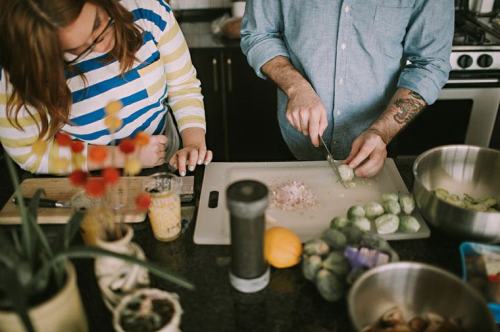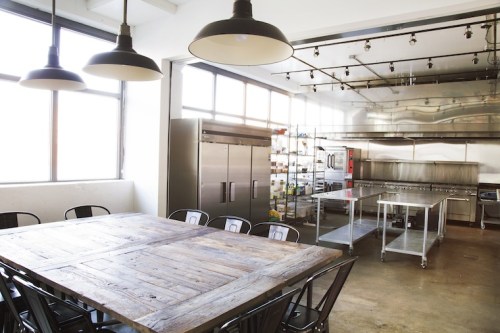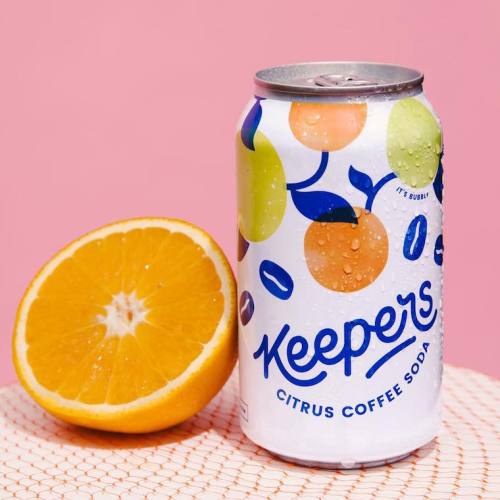How one culinary co-working space is poised to start a food revolution
Pilotworks, and co-working culinary spaces like it, are changing the way we buy and consume food—for the better.

Imagine walking into the grocery store and seeing aisles filled with indie food and beverage brands, like an adaptogenic kombucha your friend told you about and watermelon jerky. Instead of a chore, grocery shopping would be a place to discover cool products fyou didn’t even know existed.
Pilotworks (formally Foodworks) co-founders Nick Devane and Mike Dee are working toward making that a reality by providing a co-working space for food and drink entrepreneurs. Currently, 163 startup brands are making use of the incubator’s locations in New York City; Newark, NJ; Providence, RI; and Portland, ME.
The project has even caught the attention of Sweetgreen co-founder Nic Jammet, who, along with his business partners Jonathan Neman and Nathaniel Ru, invested in Pilotworks. “We were super impressed with not only Nick but the space and really believe that it solves a problem,” Jammet says. “We’re very interested in hearing about businesses connected to health and that think about the food system in a very different way.”
But how exactly does it work and what does this mean for the future of food?
Scroll down to see how Pilotworks is primed to change the way we eat.

How it all started
Before he started Pilotworks, Devane and his business partner launched Homemade, an online marketplace for home-cooked food, selling everything from vegan brownies to heat-and-eat dinners (think: Etsy for snacks and meals). In the end, the concept didn’t pan out, but the two years they spent pursuing it led directly to where they are now.
“We noticed people really wanted to launch their own food businesses, but didn’t know where to start,” Devane says. “There were also scale issues because you can’t make everything at home in your kitchen, and it’s also hard to meet all the regulations. So we started to think of a way to solve these problems.”
At the same time, he learned a 10,000 square foot space—which had commercial grade cooking equipment—within the former Pfizer plant in Brooklyn was available due to bankruptcy dealings. So, they purchased it and went from there. Devane’s background work—with included construction, software development, and everything from washing dishes to building websites for restaurants—all came into play. “None of that stuff at the time seemed like it would add up to where we are now,” he says.
The pieces needed to solve the challenges Homemade’s retailers faced—the red tape of regulation, the space to prepare enough food to meet demand—started to fall into place, leading to an entirely new startup idea altogether. Think of it as a WeWork for foodies.

How it works
As an entrepreneur, you can walk into Pilotworks with an idea and little else and they will help turn it into something legitimate. At the Brooklyn location, memberships range between $300 and $2,000 a month, depending on how much kitchen time and storage space your fledgling business needs.
“Literally everything about launching a food business was new to me,” says Watermelon Road founder Jamie Melzer, who worked in finance for 11 years before launching her healthy snack company. “But to even be able to use Pilotworks, they give you a checklist of what you need, like all the forms and the cheapest place to get insurance. It [includes] all the links, which put an end to my endless Googling.”
“I think a lot of people spend their whole living saying, ‘I have this idea’ and never try it. There’s important work in just allowing people to try and figure it out.”
“I think a lot of people spend their whole life saying, ‘I have this idea’ and never try it,” Devane says. “There’s important work in just allowing people to try and figure it out. The cool part of Pilotworks is making it easier and lowering their cost of entry—and because of that, you see so much creativity in terms of ideas. These spaces are a refinery to creativity.”

Giving brands a chance to experiment
Devane points out that the way the kitchen is set up, it’s almost impossible not to meet other people using the space. “You have to go in a big circle because the storage is in the front and the dishwashing area is in the back,” he says. (This idea of using the space to encourage collaboration may sound familiar to anyone who’s versed in the philosophy behind Google HQ’s layout.)
“There’s not this feeling there that if I succeed someone else can’t,” says Melzer, the Watermelon Road founder. “If someone gets into an organic food retailer, they offer to share the contact. Everyone wants to see the people around them succeed as well.”
Thi Lam, co-owner of Keepers, a cold brew seltzer, says Pilotworks’s mentorship program has been especially helpful in getting his company off the ground. “They have a list of everyone in every aspect of the food industry, like legal advice, branding, or business development—whoever you want to talk to,” he says. “And these people are willing to talk to you because they enjoy helping other people get started.” Lam compares the kitchen to a neighborhood, saying if you need to borrow a cup of sugar or an egg (literally), the person next to you is always willing to help out.
Even with all its benefits, the working environment isn’t perfect. For one, food makers say prime time slots in the kitchen are hard to snag. For better and for worse, it’s still a startup.

How Pilotworks is changing the way we eat
Pilotworks isn’t the only company testing out this space-sharing model. Commercial Kitchen 305 in Miami and KitchenCru in Portland both have similar plans. Making it easier for small food brands to go from home kitchens to retailers means more choice in the marketplace.
“Consumers are showing their value with their purchasing power,” Devane says. “There’s a pride that comes with identifying as a ‘foodie,’ Paleo, vegan, or something else.” Anyone who has ever Instagrammed their go-to kombucha knows exactly what he’s talking about.
The tide is changing from a marketplace dominated by heavy hitters like Kraft and Pepsi to a wider range of independent brands driven by passion first and know-how second. And there’s something to be said for a little, well, healthy competition.
Further proof the food industry is changing for the better: These millennials revolutionizing the way we eat. Plus, 5 new products that healthy foodies are excited about.
Sign Up for Our Daily Newsletter
Get all the latest in wellness, trends, food, fitness, beauty, and more delivered right to your inbox.
Got it, you've been added to our email list.








